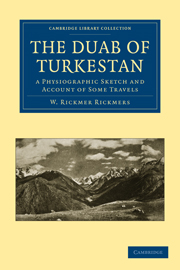Book contents
- Frontmatter
- PREFACE
- Contents
- LIST OF ILLUSTRATIONS
- CHAP. I THE DUAB OF TURKESTAN
- CHAP. II THE PHYSICAL FEATURES OF THE DUAB
- CHAP. III THE ZARAFSHAN
- CHAP. IV A VISIT TO MAKHAN-KUL
- CHAP. V BOKHARA AND THE ROAD TO KARSHI
- CHAP. VI SAMARKAND
- CHAP. VII THE ASCENT OF KEMKUTAN
- CHAP. VIII A TRIP TO THE MOUNTAINS OF URGUT
- CHAP. IX FROM SAMARKAND TO VARZIMINAR
- CHAP. X FROM VARZIMINAR TO THE ZARAFSHAN GLACIER
- CHAP. XI THE ZARAFSHAN GLACIER
- CHAP. XII TO THE MOUNTAINS OF THE FAN
- CHAP. XIII TO GARM AND THE MOUNTAINS OF PETER THE GREAT
- CHAP. XIV TUPCHEK AND THE ASCENT OF GREAT ACHIK
- CHAP. XV THE GLACIERS AND MORAINES OF TUPCHEK
- CHAP. XVI TO KALAIKHUMB AND THE YAKHSU CONGLOMERATES
- CHAP. XVII THE OXUS JUNGLES, BALJUAN, KARATAGH
- CHAP. XVIII FROM KARATAGH TO SAMARKAND
- APPENDIX
- INDEX
- LIST OF UNPUBLISHED PHOTOGRAPHS
- Plate section
CHAP. IX - FROM SAMARKAND TO VARZIMINAR
Published online by Cambridge University Press: 10 November 2010
- Frontmatter
- PREFACE
- Contents
- LIST OF ILLUSTRATIONS
- CHAP. I THE DUAB OF TURKESTAN
- CHAP. II THE PHYSICAL FEATURES OF THE DUAB
- CHAP. III THE ZARAFSHAN
- CHAP. IV A VISIT TO MAKHAN-KUL
- CHAP. V BOKHARA AND THE ROAD TO KARSHI
- CHAP. VI SAMARKAND
- CHAP. VII THE ASCENT OF KEMKUTAN
- CHAP. VIII A TRIP TO THE MOUNTAINS OF URGUT
- CHAP. IX FROM SAMARKAND TO VARZIMINAR
- CHAP. X FROM VARZIMINAR TO THE ZARAFSHAN GLACIER
- CHAP. XI THE ZARAFSHAN GLACIER
- CHAP. XII TO THE MOUNTAINS OF THE FAN
- CHAP. XIII TO GARM AND THE MOUNTAINS OF PETER THE GREAT
- CHAP. XIV TUPCHEK AND THE ASCENT OF GREAT ACHIK
- CHAP. XV THE GLACIERS AND MORAINES OF TUPCHEK
- CHAP. XVI TO KALAIKHUMB AND THE YAKHSU CONGLOMERATES
- CHAP. XVII THE OXUS JUNGLES, BALJUAN, KARATAGH
- CHAP. XVIII FROM KARATAGH TO SAMARKAND
- APPENDIX
- INDEX
- LIST OF UNPUBLISHED PHOTOGRAPHS
- Plate section
Summary
On the 19th of July, 1906, we left Samarkand for a long journey through the mountains of the Duab. My companions were my wife, Cenci von Ficker (now Frau DrSild), the Tyrolese guide Albert Lorenz of Galtür and Makandaroff, the Caucasian interpreter, who had already accompanied me on seven journeys. Lorenz is one of the best mountaineers of the Alps, while “Mac” may be described as a famous expert in all the broken idioms of Europe and Asia, as well as in cooking and laundry. To the ladies I owe a debt of gratitude for the assistance which they gave me in my photographic and other work. Six horses carried the photographic outfit consisting of a large and a small camera and a thousand glass plates. Exploring with a big apparatus is beset with difficulties tempting a man to waste his hidden store of emergency language. To get this heavy artillery into position from six to ten times during a day is a good test of nerves, but the ladies did all the drudgery, setting up the camera and handing me various objects while I made notes or calculations. Thus the firing off of exposures became a silent and smokeless affair. In the beginning it took over half an hour to unload the photo-horse, to unpack and prepare the camera, to pack and load up again, but later a record of nine minutes and a half was obtained. Some time ago I read a letter written to the press by a famous traveller, wherein he speaks of certain Indian officers as “fortunately unmarried.”
- Type
- Chapter
- Information
- The Duab of Turkestana Physiographic Sketch and Account of Some Travels, pp. 178 - 209Publisher: Cambridge University PressPrint publication year: 2010First published in: 1913



